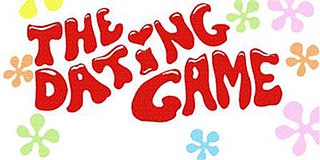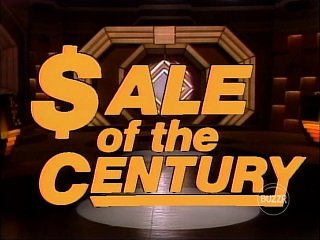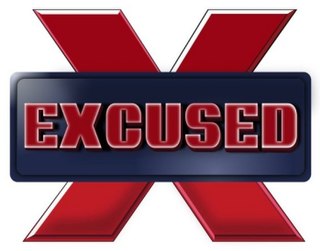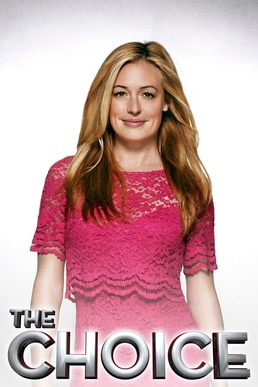
Match Game is an American television panel game show that premiered on NBC in 1962 and has been revived several times over the course of the last six decades. The game features contestants trying to match answers given by celebrity panelists to fill-in-the-blank questions. Beginning with the CBS run of the 1970s, the questions are often formed as humorous double entendres.
Dating game shows are game shows that incorporates a variety of matchmaking systems and services in the form of a game with clear rules. Human matchmaking is involved only in selecting the game's contestants, who are usually selected more for the amusement value than any concern for their happiness or compatibility. The audience sees only the game; an important feature of all dating game shows is that the contestants have little or no previous knowledge of each other, and are exposed to each other only through the game, which may include viewing a photograph or at least knowing the basic criteria for participation.

Pyramid is an American game show franchise that has aired several versions domestically and internationally. The show was developed by Bob Stewart. The original series, The $10,000 Pyramid, debuted on March 26, 1973, and spawned seven subsequent Pyramid series. Most later series featured a full title format matching the original series, with the title reflecting an increasing top prize. The game features two contestants, each paired with a celebrity. In the game, the contestants and celebrities attempt to identify words or phrases through clues given by their teammates. The title refers to the show's pyramid-shaped gameboard, featuring six categories arranged in a triangular fashion. The various Pyramid series have won a total of nine Daytime Emmys for Outstanding Game Show, second only to Jeopardy!, which has won 13.

Name That Tune is an American television music game show. Originally created and produced by orchestra conductor Harry Salter and his wife Roberta Semple Salter, the series features contestants competing to correctly identify songs being played by an on-stage orchestra or band.
To Tell the Truth is an American television panel show in which four celebrity panelists are presented with three contestants and must identify which is the "central character" whose unusual occupation or experience has been read aloud by the show's moderator/host. When the panelists question the contestants, the two impostors may lie whereas the "central character" must tell the truth. The setup adds the impostor element to the format of What's My Line? and I've Got a Secret.

Playing It Straight is an American reality television series broadcast by the Fox Broadcasting Company (Fox). The series premiered on March 12, 2004, although it was prematurely cancelled by the network following the broadcast of its third episode on March 26, 2004. Set at the Sizzling Saddle Ranch in Elko, Nevada, the series depicted fourteen men who attempted to pursue a romantic relationship with college student Jackie Thomas. However, this group of suitors was split between men who identified as straight and gay. Through a series of group activities and one-on-on dates, Thomas was required to eliminate men from the competition who she believed identified as gay. If the final suitor was a straight man, he and Thomas split a reward of $1 million. Conversely, if the final suitor was a gay man, he alone won the reward. The series was hosted by American television presenter Daphne Brogdon.

The Dating Game is an American television game show that first aired on December 20, 1965, and was the first of many shows created and packaged by Chuck Barris from the 1960s through the 1980s. ABC dropped the show on July 6, 1973, but it continued in syndication for another year (1973–1974) as The New Dating Game. The program was revived three additional times in syndication afterward, with the first from 1978 to 1980 as The All-New Dating Game, the second from 1986 to 1989, and the third from 1996 to 1999.

Sale of the Century is an American television game show that originally debuted on September 29, 1969, on NBC daytime. It was one of three NBC game shows to premiere on that date, the other two being the short-lived game shows Letters to Laugh-In and Name Droppers. The series aired until July 13, 1973, and a weekly syndicated series began that fall and ran for one season.

Singled Out is an American dating game show created by Burt Wheeler & Sharon Sussman which originally ran on MTV from 1995 to 1998. Each episode was split between 50 single women competing for a date with one male contestant & 50 single men competing for a date with one female contestant.
A blind date is a romantic meeting between two people who have never met before.

Who Wants to Be a Millionaire is an American television game show based on the format of the same-titled British program created by David Briggs, Steven Knight and Mike Whitehill and developed in the United States by Michael Davies. The show features a quiz competition with contestants attempting to win a top prize of $1,000,000 by answering a series of multiple-choice questions, usually of increasing difficulty. The program has endured as one of the longest-running and most successful international variants in the Who Wants to Be a Millionaire? franchise.

Perfect Match Australia is an Australian dating game show based on the format of the American game show The Dating Game. Perfect Match was produced by the Reg Grundy Organisation.
Dinner Date is a British dating game show, which first aired on ITV from 9 August 2010 to 28 December 2012, with subsequent new series airing on sister channel ITVBe from 8 October 2014 to 4 June 2023. The programme format was created by Jimmy Baker and Joseph Varley. The programme makes up a significant proportion of ITVBe's output, with several repeats airing daily. New-to-air episodes are generally scheduled on a weekly basis, although some episodes from the fifth series were stripped daily across weeknights.

Baggage is an American dating game show hosted by Jerry Springer and broadcast by Game Show Network. The original series premiered on April 19, 2010, airing for four seasons. A spin-off series, entitled Baggage on the Road, aired for one season, which debuted on January 7, 2015. The show has earned high ratings by GSN's standards; despite this, it has also received mixed critical reception.

Excused is an American dating reality-based competition series that debuted in first-run syndication in the United States and Canada on September 12, 2011. The half-hour series is hosted by comedian Iliza Shlesinger and created by David Garfinkle and Jay Renfroe for Renegade 83 Productions and CBS Television Distribution.

The Choice is an American television dating game show that premiered on Fox on June 7, 2012, immediately following the premiere of Take Me Out.
Who Wants to Date a Comedian? is an American reality-based dating competition series that debuted in first-run syndication in the United States on September 19, 2011. The half-hour series was created by Byron Allen through his production company Entertainment Studios.
The Voice Kids was an Australian television talent show that premiered on the Nine Network on 22 June 2014. It featured Delta Goodrem, Mel B and The Madden Brothers as the coaches.

Chains of Love is an American dating game show that aired for six episodes in April–May 2001 on the United Paramount Network (UPN). Adapted from a Dutch television series, it revolves around a man or woman being chained to four members of the opposite sex over four days and nights. This person, identified as the "Picker", is given $10,000 and can remove three contestants one at a time. The Picker can give a portion of the money to each eliminated participant. When left with a single partner, the Picker can choose to either split the money or keep it. American television personality Madison Michele hosted each episode.

Love Is Blind is a reality television series on Netflix created by Chris Coelen and produced by Kinetic Content that premiered on February 13, 2020. The show promotes itself as a social experiment where single men and women look for love and get engaged, all before meeting in person. Each season premieres episodes on Netflix over the course of 3 or 4 weeks and are followed by a reunion special and three "After the Altar" episodes that follow months later. The series has gained a large viewership and received mostly positive reviews by critics.













